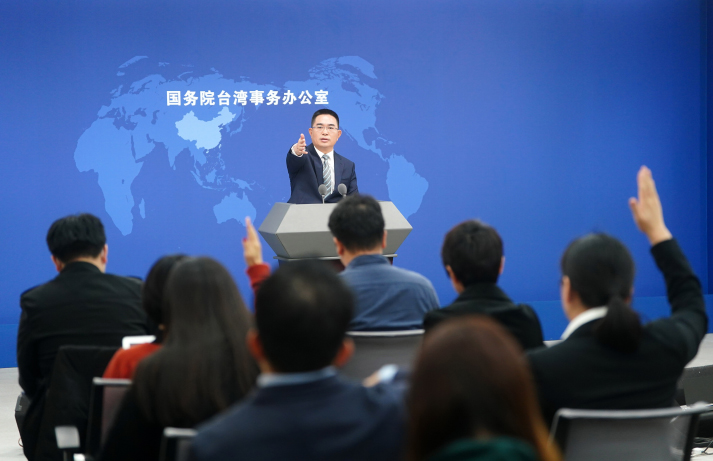| Voice |
| 'Taiwan Independence' leads nowhere | |
|
|
 Spokesperson for the Taiwan Affairs Office of the State Council Chen Binhua addresses a press conference in Beijing on January 17 (XINHUA)
Spokesperson for the State Council Taiwan Affairs Office Chen Binhua reiterated on January 17 the Chinese mainland's determination to unwaveringly advance national reunification, responding to a media query on the recently concluded Taiwan regional leadership and legislative elections. The so-called "elections" were held on January 13. The pro-"Taiwan independence" Democratic Progressive Party (DPP) candidate Lai Ching-te and his running mate Hsiao Bi-khim won the leadership election. Chen said the election outcomes cannot shake the fact that Taiwan is a part of China, cannot change the basic landscape and development trend of cross-Straits relations and cannot impede the inevitable trend of China's reunification. Regarding the mainland's policy toward Taiwan for the foreseeable future, Chen said, "We will unswervingly adhere to the 1992 Consensus that embodies the one-China principle, firmly oppose 'Taiwan independence' and uphold peace." He added that the mainland will expand cross-Straits exchange, promote cooperation and deepen integration to advance national reunification. Lai's election is the result of a mix of many factors and cannot be construed as a triumph for "independence" forces, Taiwan studies experts said. According to Zhu Weidong, Director of the Institute of Taiwan Studies at the Chinese Academy of Social Sciences, although Lai won the leadership election, it does not represent mainstream public opinion on the island, as he only received the support of about 40 percent of voters. In the election, the DPP's share of the vote and the number of voters supporting the party's candidate reached their lowest-ever levels this year. Since the introduction of "direct elections" in 1996, winning candidates have usually received more than 50 percent of the vote, with only two exceptions. One was in 2000, when the DPP's Chen Shui-bian received 39.3 percent, and the other was Lai's 40 percent this time. The dissatisfaction with the DPP's past eight years in power and the call for better economy and cross-Straits exchange, represented by the opposition parties which combinedly won nearly 60 percent of the vote, reflected mainstream opinion on the island, Zhu said. The proposed alliance between the Chinese Kuomintang (KMT) and the Taiwan People's Party (TPP) in the election failed to come into being. Capitalizing on their disunity, Lai advocated actions against reunification with the Chinese mainland and heightened cross-Straits tensions, effectively diverting voter focus. The decline in votes for Lai, when compared to the DPP's performance in the last two leadership elections, indicates a significant drop in support. Additionally, the party has forfeited its legislative advantage, after failing to retain a majority in the island's unicameral legislature, limiting the prospects for passing its policies in the future. In the election of the 113-seat legislature, the KMT garnered 52 seats, the DPP won 51 seats, and the TPP seized eight seats. The remaining two went to independent candidates. Examining the changes in the province's public opinion demonstrated by this election, Ni Yongjie, Deputy Director of the Shanghai Institute of Taiwan Studies, contended that the dominant sentiment on the island remains inclined toward cross-Straits peace, progress, communication and cooperation. Most Taiwan residents seek a stable and amicable cross-Straits relationship and express dissapproval toward Lai's personal stance, the DPP's ability to govern, and its approach of leaning on the U.S. to counter the mainland. After the DPP's two terms in power, the public views the "Taiwan independence" rhetoric as delusional and an unattainable goal, Ni said. Zhu stressed that promoting "Taiwan independence" will only exacerbate the existing lack of mutual trust, escalate cross-Straits tensions and increase the risk of cross-Straits relations spiraling out of control. Chinese Foreign Minister Wang Yi said on January 14 that the outcome of the recent leadership election in the Taiwan region won't change the prevailing consensus of the international community on adhering to the one-China principle. He stressed that Taiwan's "independence" has never been possible in the past and certainly won't be possible in the future. Copyedited by Elsbeth van Paridon Comments to liwenhan@cicgamericas.com |
|
||||||||||||||||||||||||||||||
|